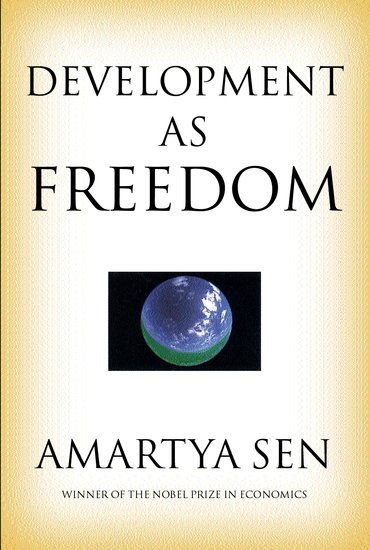
Development as Freedom
by Amartya Sen
Published by: Anchor, 1999
Genre: Nonfiction | Business & Economics
Page Count: 384 (Paperback)
Audiobook Length: 11 hours and 22 minutes
Audiobook Narrator: Byron Wagner
ISBN: 9780385720274
Publisher’s Description
In Development as Freedom Amartya Sen quotes the eighteenth-century poet William Cowper on freedom:
Freedom has a thousand charms to show,
That slaves however contented, never know.
Sen explains how in a world of unprecedented increase in overall opulence, millions of people living in rich and poor countries are still unfree. Even if they are not technically slaves, they are denied elementary freedom and remain imprisoned in one way or another by economic poverty, social deprivation, political tyranny or cultural authoritarianism. The main purpose of development is to spread freedom and its ‘thousand charms’ to the unfree citizens.
Freedom, Sen persuasively argues, is at once the ultimate goal of social and economic arrangements and the most efficient means of realizing general welfare. Social institutions like markets, political parties, legislatures, the judiciary, and the media contribute to development by enhancing individual freedom and are in turn sustained by social values. Values, institutions, development, and freedom are all closely interrelated, and Sen links them together in an elegant analytical framework. By asking “What is the relation between our collective economic wealth and our individual ability to live as we would like?” and by incorporating individual freedom as a social commitment into his analysis, Sen allows economics once again, as it did in the time of Adam Smith, to address the social basis of individual well-being and freedom.
About the Author
Amartya Sen is an Indian economist and philosopher, born on November 3, 1933. He is widely regarded as one of the most influential thinkers in the fields of development economics and social justice. Sen has made significant contributions to welfare economics, social choice theory, and the understanding of poverty and inequality.
He was awarded the Nobel Prize in Economic Sciences in 1998 for his work in welfare economics, particularly for his development of the capability approach. The capability approach focuses on individuals’ freedom to achieve well-being and emphasizes the importance of enhancing people’s capabilities rather than solely focusing on economic metrics.
Apart from his academic contributions, Sen has been actively engaged in public discourse on social issues and policy. He has held various academic positions, including professorships at Harvard University and the University of Cambridge. Sen’s notable works include “Development as Freedom,” where he explores the connection between economic development and individual freedoms, and “The Idea of Justice,” where he discusses theories of justice and ethical considerations in public policy.
Amartya Sen’s work has had a profound impact on the fields of economics, ethics, and social sciences, influencing both academic research and policy discussions worldwide.
